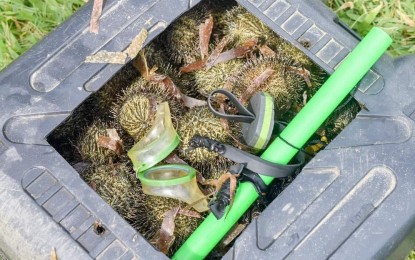
RED TIDE ALERT. Sea urchins gathered at the Bogo-Medellin bays in northern Cebu province are tested positive for paralytic shellfish poison. Bureau of Fisheries and Aquatic Resources -Central Visayas OIC Mario Ruinata on Wednesday (Oct. 25, 2023) advised the residents in Bogo City and the neighboring town of Medellin to avoid collecting and eating shellfish and "acetes" species, locally known as "alamang" due to red tide contamination. (Photo courtesy of Bogo City LGU)
CEBU CITY – The Bureau of Fisheries and Aquatic Resources (BFAR) in Central Visayas expanded on Wednesday the red tide alert to the northern mainland Bogo-Medellin bays.
Mario Ruinata, officer-in-charge of BFAR-7, said local government units in the city of Bogo and the neighboring sugarcane town of Medellin have already advised their respective constituents against gathering, selling and eating shellfish amid red tide contamination in the seawater of the two localities.
“To safeguard human lives and mitigate impacts on the shellfish industry while waiting for the results of the confirmatory analysis, this warning is issued as a precautionary advice to the public to refrain from gathering, selling, and eating all types of shellfish and acetes species, locally known as “alamang” from the coastal waters of Bogo-Medellin bay," Ruinata said in his advisory.
A laboratory analysis conducted by the regional Fisheries Laboratory on one sea urchin sample collected in Bogo-Medellin Bay tested positive for paralytic shellfish poison (PSP).
“Fish, squid, crab, and shrimp are safe to eat provided that all entrails are removed and washed thoroughly with running water before eating,” he said.
On Monday, the municipal government of Madridejos banned the collection and harvesting of shellfish or bivalves like clams, oysters, and scallops from the affected areas.
The Municipal Agriculture Office of Madridejos town advised their constituents against eating contaminated seafood to avoid intoxication. (PNA)
